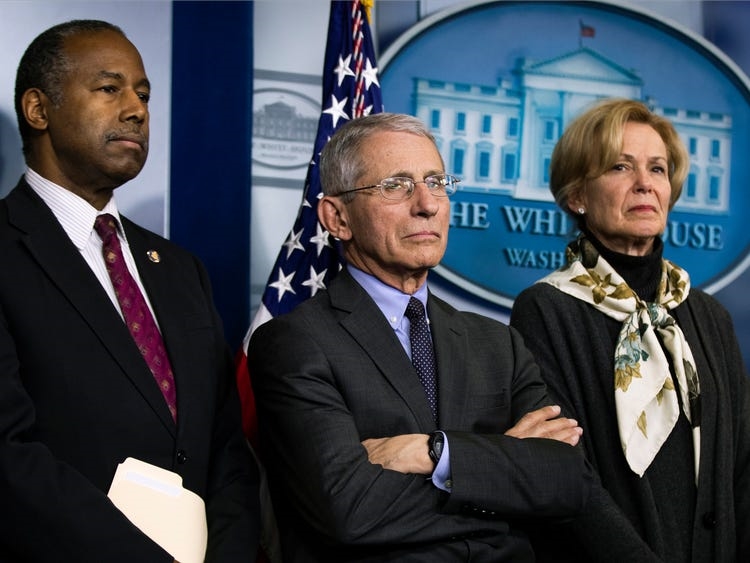Fauci Addresses Contact Tracing, Scientific Collaboration, BTS Protocols In Live Healthline.com Discussion
Fauci Addresses Contact Tracing, Scientific Collaboration, BTS Protocols In Live Healthline.com Discussion
 When the COVID-19 pandemic spread to the United States, the country didn’t have a system for health contact tracing. Since then, technology has exploded with tracing apps from Apple and Google, along with one from a Microsoft company called ProudCrowd.
When the COVID-19 pandemic spread to the United States, the country didn’t have a system for health contact tracing. Since then, technology has exploded with tracing apps from Apple and Google, along with one from a Microsoft company called ProudCrowd.
Staffing and technology to better track the spread of COVID-19 have also improved, depending on the density in the area of the infection, said Dr. Anthony Fauci, director of the National Institute of Allergy and Infectious Disease, on Tuesday.
“When you have good control and a good baseline and have a blip of cases — either one, three, 10 or 20 — it’s something you can identify and isolate,” he said. “If you have community spread, where you know 40% of the people infected are completely asymptomatic, and there’s community spread, it makes it much more problematic.”
Another major problem in many countries across the world is the delay in getting results from testing because it means there is always someone out there who is potentially spreading the infection.
“We are trying hard to correct it,” he said.
When asked how he will acknowledge success, Fauci said he will do so when the percentage of positive tests drop to the point that New York City has now reached. NYC’s positive cases have dropped to less than 1%. In some parts of the country, positive case rates are between 15% and 20%, which he said is too high.
Healthline.com used live streaming media to address an invitation-only audience on Tuesday, where Fauci spoke as a featured guest on the Healthline Live Town Hall webcast titled “Making Sense of a Crisis” about topics not discussed such as contact tracing and community spread of the pandemic, back-to-school protocols, vaccines, and how the United States works with the international community.
The renowned physician said the U.S. is collaborating scientifically with other countries and sharing insights, although this is not often discussed.
There are scientific collaborations with colleagues in Europe, Australia, Canada and Mexico, among other regions. Clinical trial networks are underway in Brazil, South Africa, Chile and Peru.
Fauci also answered questions about Russia’s recent vaccine announcement after less than two months of clinical trials, and warned against being too confident after such a short time of testing.
“To say you have a vaccine and to say you have a vaccine that’s proven effective [are different], he said. “For all practical purposes I could say we have six vaccines, but I wouldn’t give it to anyone except in a clinical trial. … The public needs to understand the distinction.”
There are three phase three trials underway in the U.S. The medical community will likely know by the end of the year or by the the beginning of 2021, if the one that began the third phase on July 27 is effective, he said.
The rollout of the vaccine to the public will be determined by an advisory community of immunization practices, which advises the CDC, and a committee put together by the National Academy of Medicine. Well into 2021, it’s likely there will be enough vaccines for all people in the United States.
With schools now re-opening, the question arose on the type of guidance Fauci is giving to schools — to teachers, parents and students.
“It’s better to ease in virtually until you see what’s going on in a really hot zone,” he said. “Taking the country as a whole won’t work.”
He said the general default should be to look to open schools for the reason given by the American School of Pediatrics — sometimes, the nutrition and psychological health of the children.
Schools must pay particular attention to the health and welfare of the children, teachers and parents. Not all cities nationwide can operate on the same scale, he said, because of the differences in the rates of infection.
Dr. Elaine Hanh Le moderated the live stream and at points included Raj Dasgupta, a facility member at the University of Southern California; and Dr. Timothy Legg, doctor of nursing practice at Rocky Mountain University of Health Professions.
Legg, who also focuses on mental health, agreed with the moderator that people can see the same data and the same facts, but from the data they can take away a completely different conclusion.
Legg also pointed to developmental bias, when a piece of scientific evidence conflicts with a person’s own intuitive cognitive development. People tend to reject this in this situation. There is also confirmation bias, where people look for information that supports a person’s existing knowledge, which also contributes.
The pandemic is having a significant influence on mental health. If the country goes through another lockdown, Legg said, he thinks people will meet the decision with a lot of resistance.
(54)


